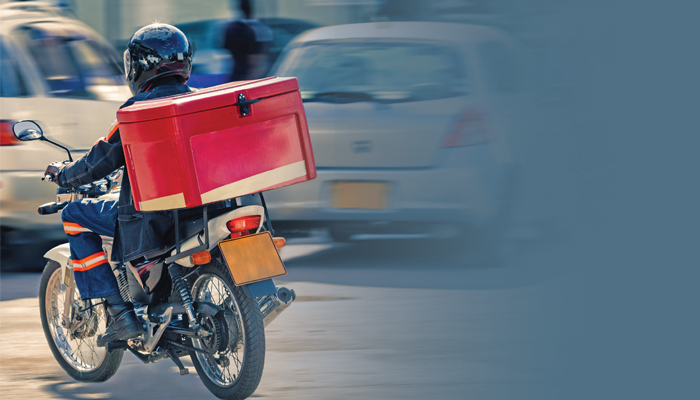
Muscat: Are you having trouble ordering food from your favourite restaurant after 8pm? If so, you are among many in Oman who are facing the same difficulty.
Although restaurants and cafes are allowed to run home delivery operations after the lockdown comes into effect at 8pm, orders placed with many restaurants through food delivery apps do not go through.
Furthermore, people employed in essential roles that require them to travel even after 8pm say they are being turned away from restaurants when they go to pick up food. This is because the only way to place orders are through these delivery services.
“I was leaving work and wanted to pick up food for my family around 9pm,” said Faisal, an Omani living in Qurum.
“I tried ordering through a delivery app, but my requests kept getting rejected, despite trying from many restaurants. My kids were hungry, so I decided to order food from the restaurant directly, and planned to collect it myself.”
Faisal was told by the restaurants, however, that there is no curbside pickup available: the only way to order is through food delivery companies.
Thomas, another Muscat resident who attempted multiple orders through food delivery apps after 8pm, was also unsuccessful in his efforts.
“This will be quite concerning for many families, as many eat food only after 8pm,” he said. “There is a certain enjoyment you get when you order in, but it is not always going to be possible for people to place orders, or even get them completed, before 8pm.”
A food delivery company official said, “All of our drivers are freelance operators sourced through external hiring agencies. Currently, some of them do not have enough Omani drivers for hire, so we are unable to deliver after 8pm due to the lower supply of riders."
"Freelance delivery jobs at talabat are now only dedicated for locals, and we can only hire potential Omani drivers through licensed manpower companies. As we continue to ensure we follow the law and align with government directives, we will continue to source new delivery drivers to join our fleet through licensed manpower companies. We’re working hard to ensure the required number of drivers are onboarded at the soonest. With a growing demand for Omani freelancers to join our delivery fleet, we invite manpower companies to approach us and get in touch with our team,” the official added.
Restaurant owners in Muscat say that this has further impacted their business, which was already hit by the economic effects of the ongoing COVID-19 pandemic.
Some are able to send out a few orders at a time, because they employ full-time drivers that are part of their staff and have received clearance to travel after 8pm.
“We did ask the food delivery companies why they were unable to assist us here, and there are many reasons for this: we were told that drivers’ licences are no longer being provided for lower range bikes, which is what many food delivery riders use to drop off their orders,” said the owner of a restaurant in Ruwi.
“Secondly, it is difficult to receive clearance to travel after 8pm, so that’s another issue that is affecting them.”
The owner hoped that clearances would be given to more delivery drivers soon, so that restaurants and other services that rely on deliveries can get business that will help them offset to some level the impact of the pandemic.
Although he does employ a company driver, he is forced to cancel five out of every 10 orders he receives, because there is no one to deliver them on time.
“A few days ago, I received a call from a lady who lived nearby, asking us to deliver food to her family because they had run out of cooking gas,” recalled the restaurant owner.
“My driver was out delivering other orders, so I decided to deliver the food myself, because she needed dinner. There was no other alternative but for me to go.”
Another restaurateur said he had hired two staff drivers after the pandemic had started, so that he could guarantee his customers hot food, after he had received complaints from people who had ordered from his establishment through food delivery services.
“We were told that their food used to arrive after an hour or even two, by which time it would be cold and unappetising,” he said.
“Our objective is to provide hot food, on time, and we decided to take the responsibility of delivering this ourselves. The feedback since then has been really positive, because people now receive their food inside 20 minutes.”
However, Gaurav Nahar, the CEO of Omani food delivery firm Akeed, said they have about 150 Omani drivers working in rotation, which means they are able to provide food to customers during the lockdown as well.
“We do get many Omanis coming to us who are willing to work as food delivery drivers, and we often hire them after putting them in touch with a registered manpower company,” he said.
“These Omanis, as well as the expatriate drivers we have on visas, have helped us deliver food to people. The current challenges have actually provided us the opportunity to push Omanisation among food delivery services, and as a local company, it’s a responsibility we take seriously.”
Restaurant owners suggested that the rule on allowing only locals to take up freelance driver jobs be temporarily lifted, to cope with the increased demand on delivery services during the current situation, until such time that Omanis are trained to take up such jobs in the coming months.
“The current situation can help Omanis to learn on the job, and they will be readily available to take on such roles in future, even after the lockdown ends,” said a café owner.